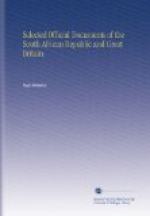ARTICLE 13.—The people charge the President with the task of proposing and executing the laws; he also brings before the Volksraad the appointments of all civil servants for ratification.
ARTICLE 14.—The people entrust the maintenance of order to the military force, the police, and other persons appointed by the law for that purpose.
ARTICLE 15.—The people place the judicial power in the hands of a Supreme Court, Circuit Court, Landrosts, Juries, and such other persons as shall be entrusted with judicial powers, and leave all these free to discharge their function according to their judgment and consciences, according to the laws of the land.
ARTICLE 16.—The people shall receive annually from the Volksraad an estimate of the general income and expenses of the State, and learn therefrom how much every man’s taxes shall amount to.
ARTICLE 17.—Potchefstrom, situated on the Mooi River, shall be the capital of the Republic, and Pretoria the seat of Government.
ARTICLE 18.—All services rendered on behalf of the public are remunerated by the public.
ARTICLE 19.—Freedom of the press is granted provided the printer and publisher remain responsible for all the documents which contain defamation, insult, or attacks against any one’s character.
OF THE PROTECTION AND DEFENCE OF THE STATE.
ARTICLE 20.—The people shall only appoint as representatives in the Volksraad those who are members of a Protestant Church.
ARTICLE 21.—The people desire the growth, prosperity, and welfare of the State, and with this view provision for suitable school teachers.
ARTICLE 22.—Providing also that in time of peace precautionary measures are taken to enable the State to wage or withstand a war.
ARTICLE 23.—In case of a hostile attack from outside, everyone, without distinction, shall be held bound to lend his assistance on the promulgation of martial law.
ARTICLE 24.—No treaty or alliance with foreign powers or peoples may be ratified until the Volksraad has expressed its feelings upon the same, the treaty requiring to be ratified and passed or else cancelled according to the judgment of the Volksraad, with exception of those treaties which the Government is empowered by law or Volksraad resolution to make.
ARTICLE 25.—In case of threatening danger for the State or in time of war, the right of judging as to whether such treaty or alliance is advisable or not is left to the Commandant-General advised by the Military Council, if the commandos are in the field, and there is no time to consult the Executive Council.
OF THE VOLKSRAAD, THE HIGHEST AUTHORITY, OR THE LEGISLATIVE POWER.
ARTICLE 26.—The Volksraad shall be the highest authority of the country, and the legislative power.
ARTICLE 27.—No civil servants are to be representatives of the people.




